
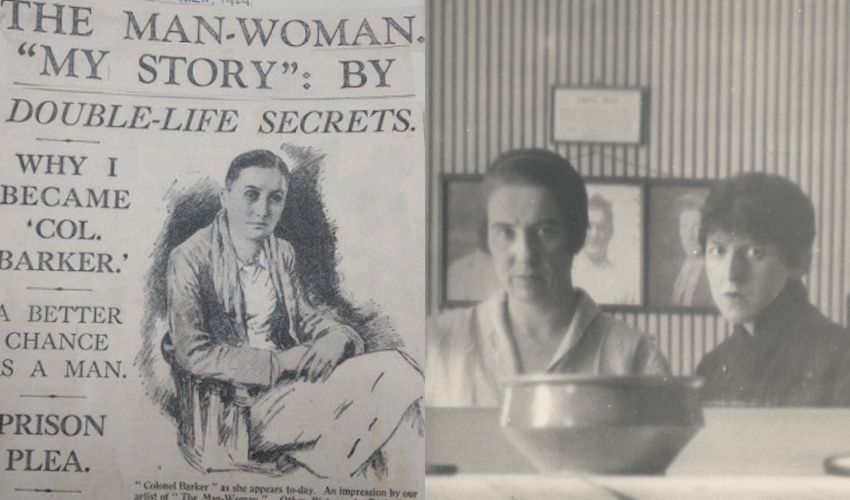

The CEO of a local equality charity is inviting islanders to join an historical tour of the lives of some of the LGBT+ characters who were either born in the Channel Islands or landed on their shores.
Every Friday, Express presents a selection of online and offline exhibitions, performances, workshops, events and other historic, creative and delicious content to help islanders get their weekly dose of culture.

Pictured: Vic Tanner Davy, the CEO of the Channel Islands’ equality charity Liberate and a member of Jersey Heritage’s Diversity and Inclusion panel.
As part of LGBT History Month, an annual month-long observance of lesbian, gay, bisexual and transgender history, Vic Tanner Davy, the CEO of the Channel Islands’ equality charity Liberate, will be presenting the fruit of his research on the lives of LGBT+ people in the Channel Islands next week.
'Our Queer* Channel Islands' will take place at Jersey Museum on Thursday 17 February between 19:00 and 20:00.
Vic, who is also a member of Jersey Heritage’s Diversity and Inclusion panel, will share, among others, stories about Claude Cahun and Marcel Moore, Colonel Victor Barker as well as Lillie Langtry and her friendship with Oscar Wilde.
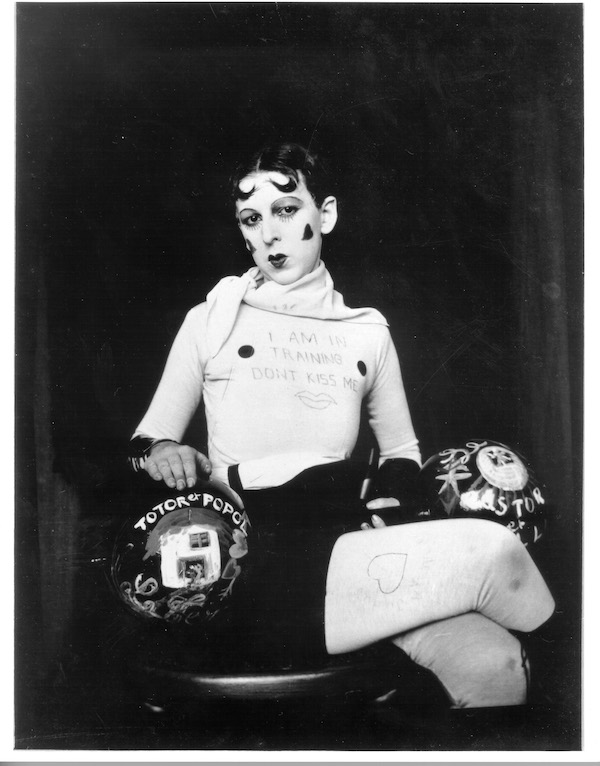
Pictured: 'I am in training don't kiss me', a self-portrait by Claude Cahun. (Jersey Heritage)
Often forced to leave Jersey or Guernsey to pursue a more authentic life away from the close confines of the islands, these people had to demonstrate resilience and resourcefulness in the face of social and judicial censure.
The earliest documentation Vic discovered through his research relates to the early 1800's Anne Lister and one of her Guernsey lovers.
"The problem or researching this history, because it’s very easy to put a modern lens on relationships in the past, when you think about somebody like Anne Lister, lesbian is not a term in their vocabulary and it’s not how they would describe themselves," he explained "We can label certain relationships where the person themselves would have not necessarily described themselves as such because the society was different and viewed this differently."
The talk then moves into the late 1800s with the friendship between Oscar Wilde and Lillie Langtry. Vic notes Lillie was breaking social barriers in her behaviour as she had affairs with married men as well as the Prince of Wales while Oscar Wilde was married but had a gay life.
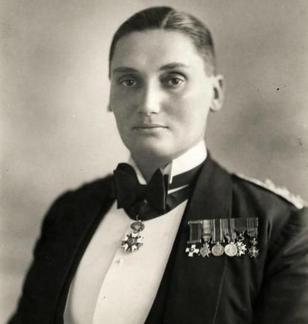
Pictured: Colonel Victor Barker was born in 1895 in St. Clément.
Colonel Victor Barker, who was born in 1895 in St. Clément, also features in the talk. "He lived a transgender life but at this point there was no ability to transition, it was very early science and it was not something that was available in the way that it is now," Vic explained.
"He lived a very interesting and very turbulent life which involved all sorts of adventures. He lived very much in the fringe of society and the idea of LGBTQ people being in the fringe is very present in the history we can research."
Vic's talk then reaches the 1980’s when "things started opening up" and there were calls for homosexuality to be decriminalised, and 1990 when homosexual activity was decriminalised in Jersey.
With the lives of the people mentioned in Vic's talk often deliberately hidden from authorities and, by extension, the historical researcher, piecing together the fragments that remain for a modern audience with a greater understanding of the multiplicity of sexuality and gender identity has been a fascinating and, at times, frustrating task.
"The problem of this type of research is you research something that is quite often criminal because for so many years it was illegal," he explained. You are constantly struggling with the fact people had to hide their lives. Documents such as a diary are incredibly rare."
In the absence of diaries recording someone's life, court stories and, in more recent years, memories from the older generation of the local LGBT+ community have proved invaluable.
"In court pages, we could see the evidence of gay lives," Vic said. "We do have little snippets from police pages in the JEP where the behaviour of a particular person is being discussed, denigrated and sometimes even penalised, particularly about gay men.
"Women’s history is a hidden history anyway because they were often not educated and did not have the ability to write their stories. They are hidden because they were gay and they were hidden because they were women, so you’ve got a double whammy there.
"There is stuff coming up all the time. The older generation will tell me about someone who had a gay life. We get little snippets here and there which we take and gather and put the pieces together but it’s difficult. We can only go back as far as people remember. It does mean that there is kind of a gap in our knowledge."
* The word queer is used in the context of the academic discipline of ‘queer studies’.
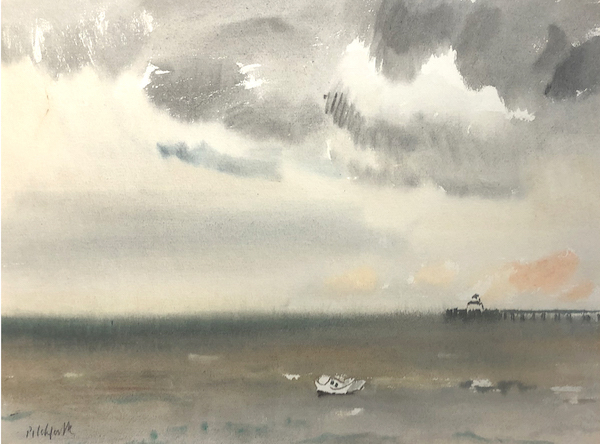
Pictured: 'Herne Bay' by Roland Pitchforth.
CCA Galleries International is this month presenting 'Turn of the Century Watercolour' a collection of original works dating back to the late 1800’s.
It features notable works of art by Roland Pitchforth, Robert Bevan, Bernard Sickert and Donald Hamilton Fraser, presented together for the first time.
"The works shown have been chosen for their representation of the land around us – landscapes, seascapes and provincial scenes are all displayed here by artists esteemed for their draughtsmanship," Gallery Manager Tom Parker said.
"An important, fundamental skill for an artist during this era was the ability to draw accurately and what we see here, in this curation, is artwork by a group of artists who have all built a world of expression on the very solid foundation that drawing provides.
Kairos Arts, which offers therapeutic creative therapy workshops, is inviting islanders for a conversation with Arts Therapist Wendy Durrell at the St. Helier Methodist Centre Café this Sunday at 15:30.
Based in Jersey, Wendy works as an art therapist, consultant and clinical supervisor and has experience of working with children and adults.
She will share insights into her work in the UK as an Arts Therapist providing individual and group sessions in mainstream and special schools.
Whilst the afternoon should be of particular interest to those interested in art and creative therapies, including professionals already working in the field, Cathy Sara, Founder and Director of Kairos Arts, says she thinks the conversation with Wendy has wide appeal.
“It would suit anyone who is creative and interested in the impact of the arts and how they can be used therapeutically, but also anyone working in professions where the arts could be of a benefit,” she said. “The focus of Wendy’s talk will be her work in schools with children and young people, both in mainstream and special schools, so we hope the afternoon will also be of interest to teachers, people who work in schools, SENCOs, social workers and carers.”
Early 19th century records of the construction and establishment of the Jersey’s old prison in Newgate Street, as well as prisoner records from that time, are now available to view Jersey Heritage’s Archive and Collections Online Catalogue.
One of the stories available is that of Charles Carus Wilson who was placed in Debtor’s Prison in September 1844 for contempt of Court until he paid a fine of £10 to her Majesty and made an apology to the Court for his behaviour.
He remained there for five months, writing insulting letters to officials and submitting a report that his cell was too draughty and making him ill. He also complained that he wasn’t allowed a bell so that he could call the doctor when he needed him, and he asked for two candles a night at the Prison Board’s expense.
Wilson also demanded to be allowed to exercise in the gardens and “not walk and prowl among Privies and Sculleries like a Dog”.
Jersey Archive will be hosting a talk on the records that were recently opened to the public on Saturday 19 February at 10:00. The talk is free, to book your place, call 833300 or email archives@jerseyheritage.org
Felting workshop

Pictured: Children and their carers will get to try their hand at felting at the Harbour Gallery.
As part of children’s month, the Harbour Gallery is hosting a parent/carer and child felting workshop Sunday 13 February between 14:00 and 16:30.
The £26 fee includes an adult and child over the age of 12, unaccompanied childred will be charged £10. All supplies are included.
Bookings can be made via email partintheframe@yahoo.co.uk or by calling 01534 743044, closed Tuesday.
Half-term fun
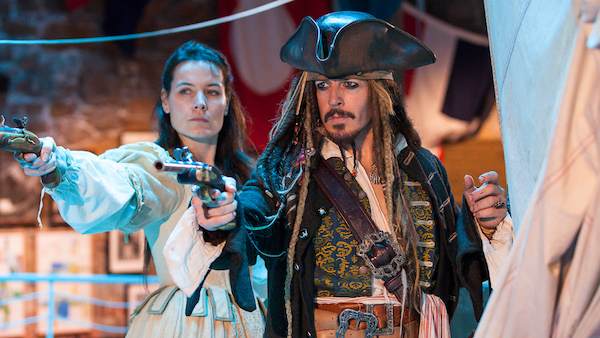
Pictured: The pirates are coming to the Maritime Museum for half-term.
Grab your cutlass and your eye patch, the pirates are coming to the Maritime Museum.
Jersey Heritage is welcoming pirates back for five days of swashbuckling, action-packed, family entertainment from Monday 21 to Friday 25 February.
“We are delighted the pirates are returning to Jersey and the Maritime Museum,” Nicky Lucas, Jersey Heritage’s Events Curator, said. “It’s been a while since they were last on our shores but we’re certain they will prove to be as popular as ever. We’ve got plenty of fantastic entertainment lined up over the half term week and would love to see as many would-be pirates as possible dressing up to add to the atmosphere.”
There will be two two-and-a-half hours Pirates sessions each day, from 10:00 to 12:30 and 13:30 to 16:00.
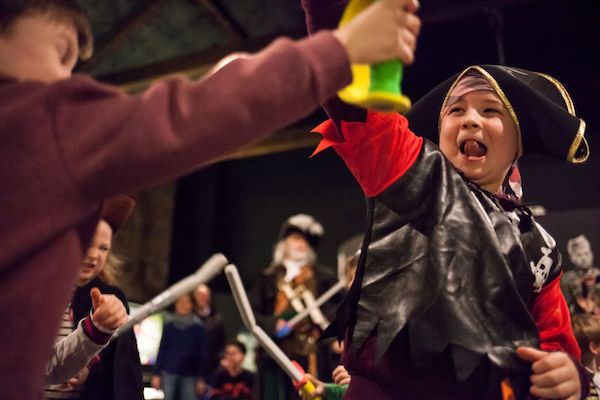
Pictured: Various activities will be available for visitors.
As well as meeting the pirates, visitors will have the opportunity to learn about life on-board a ship and to take part in various activities. Entry is free to Jersey Heritage Members and children under the age of six.
Nicky added: “Pirates at the Maritime Museum is one of our most popular events and we strongly advise everyone – including Jersey Heritage Members – to book their sessions in advance on Eventbrite so that they don’t miss out."
(Lead image: A newspaper from 1929 featuring Colonel Barker and a photograph of Claude Cahun and Marcel Moore. Credit: National Archive / Jersey Heritage.)
Comments
Comments on this story express the views of the commentator only, not Bailiwick Publishing. We are unable to guarantee the accuracy of any of those comments.